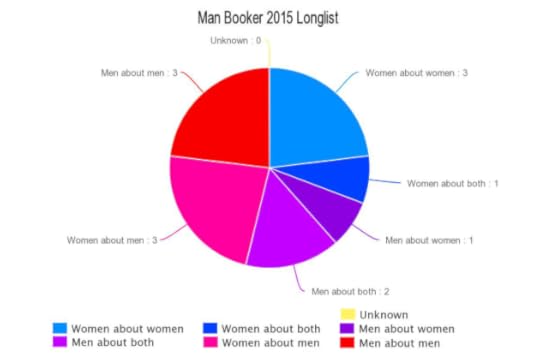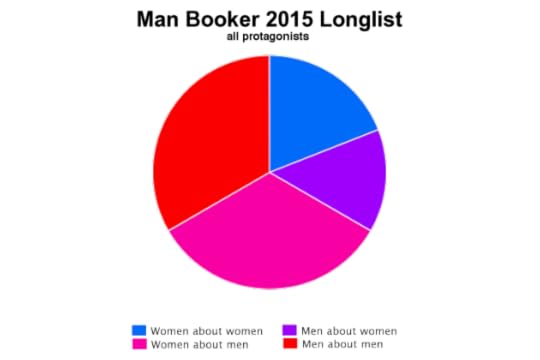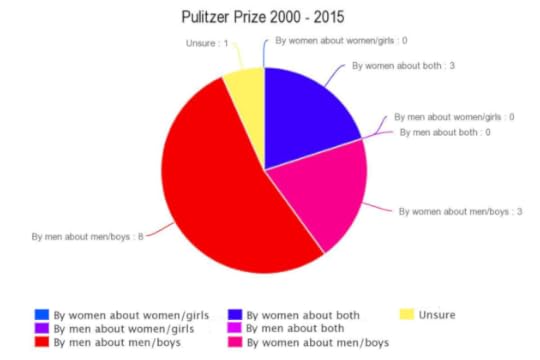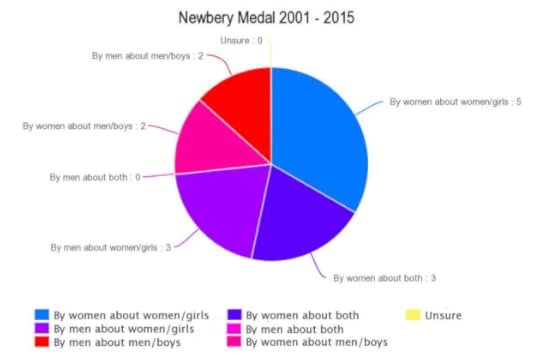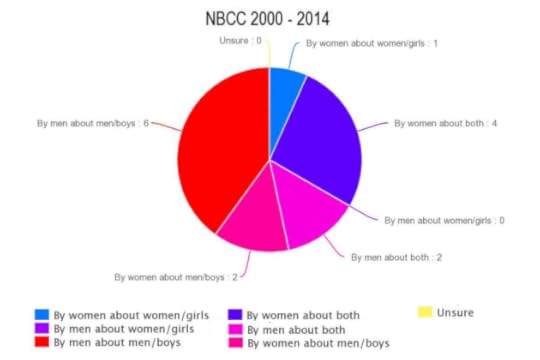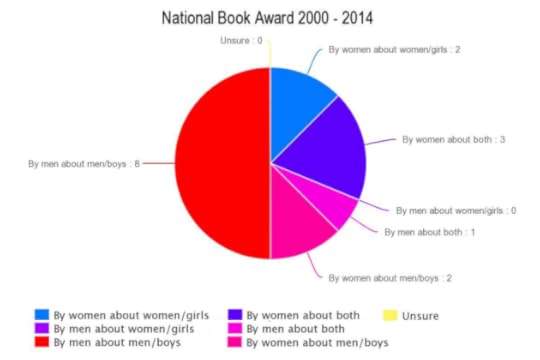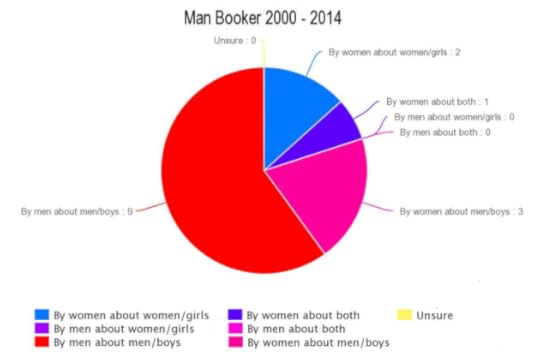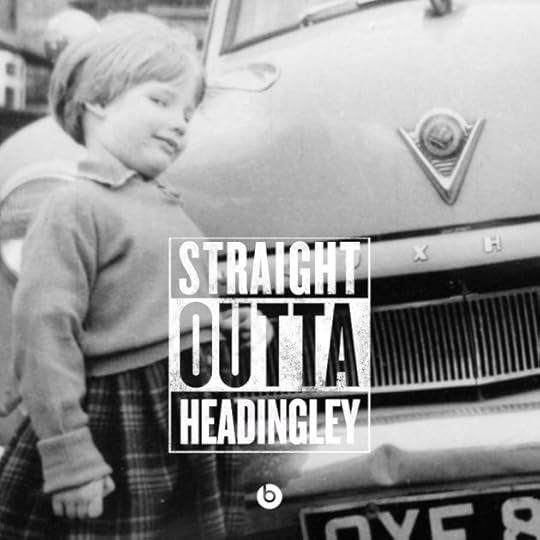Nicola Griffith's Blog, page 71
August 13, 2015
Man Booker 2015 longlist: gender of the protagonists
Thanks to the volunteers who have signed up to count literary prize data1 we now have more granular information coming in about literary prizes. And the more granular we get, the more interesting the picture becomes.
A couple of months ago I documented what appeared to be substantial gender bias in literary awards over the last fifteen years: even when women win prizes it’s likely to be for writing about men. The more prestigious the literary award, the more likely the subject of the narrative will be male. Those pie charts Indicated imbalance even if, say, a short story collection featuring a dozen men and one woman was counted as being equally about both.
But thanks to more people counting, we now have the ability to look deeper.
Here’s the most recent Man Booker longlist as an example2. This is an apparently diverse longlist: lots of writers of colour, with a preponderance of women: of the 13 books, 7 are by women and 6 by men.
When we take a look at the gender of the protagonists using my previous, simplified counting method (and comparable design and colours for the charts), this is what it looks like:
That ends up as 6 books about men, 4 books about women, 3 about both. Not parity. But better by far than the gender ratios of prize winners of the last 15 years. However, when we look deeper—when, for example, we take into account that one novel has 1 female protagonist and 3 male, and another has 0 female protagonists and 4 male–the picture looks a little different.
Even in this comparatively equal list, in which female authors outnumber male, 14 of the 21 protagonists, two thirds, are men. In other words, when it comes to the books deemed worthy of long-listing for a prestigious literary prize, both women and men tend to write about men more often than they write about women.3, 4
More data as and when it comes in.
1 We are looking for volunteers: to count, to spread the word, to collate. If you want to help, sign up for the Google group, Literary Prize Data.
2 As before, I welcome corrections. If you’ve read all the books, and by your count this is all wrong, please say so!
3 This design’s a bit different: for example, I’ve left out “Unknown,” and frankly forgot to label the pie segments. If you sign up for the Google group you can see the raw data. Sometime soon I’ll figure out a better, more clear way to present all this stuff.
4 Why? Well, I have some thoughts about that. See my interview with the Seattle Review of Books.








August 10, 2015
Where to sign up to count literary prize data
A number of people have expressed interest in helping to count literary prize data. The data so far show a consistent, persistent, and striking bias: when women win literary awards, it’s usually for writing about men. In fact, the more prestigious the literary prize purports to be, the less likely it is to go to a woman writing about women.
To aid the gathering of data, I’ve set up a Google Group, Literary Prize Data. If you’re interested in staying abreast of what’s going on, or just want to count something, please go sign up.
If you emailed me before, I’ve just sent you an invitation to the group/mailing list. If you haven’t heard from me, that email’s gone astray somewhere. (Check your spam and junk folders.) But this is where it will all happen, so please go sign up here!)
As a reminder of why we’re doing this, here’s the data I’ve put together so far:
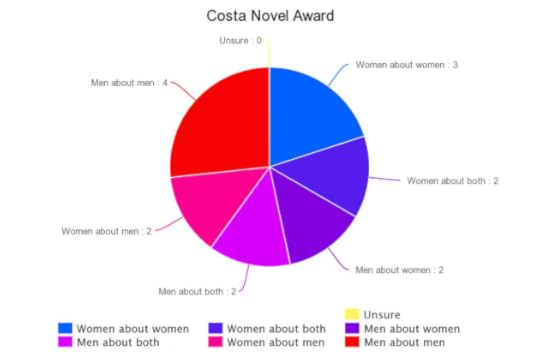
It would be great to gather data on the following prizes and/or geographic regions:
most recent Man Booker longlist
fantasy and sf and horror awards: World Fantasy, Campbell, Locus, Nebula etc
crime fiction awards: Edgar and Macavity and the Daggers, etc
Canadian awards (see the start that Maclean’s made)
Australian and New Zealand awards (see Nike Sulaway‘s info on this)
Scottish awards (I know at least one person is already working on this)
Irish awards (ditto)
Indian awards
historical fiction awards
children’s/YA awards (see the amazing amount of data, to 2012, gathered by Ladybusiness)
This is just a first pass. If you’ve been assembling data on anything else to do with bias (conscious or unconscious) in the publishing ecosystem, by all means send it!
The kind of data I’m looking for, exactly:
the last 15 years of awards, preferably broken down by year so we can maintain, sort, and resort records as we move forward
winners, shortlists, longlists
gender of writer
gender of protagonist
I’m happy to get more detailed later, but for now I’m seeking volunteers to cover these things. And others to figure out the best way to collate and present this data. I’d love to use better/more intuitive colours, for example. The more of us who count, the less each individual has to do. Many hands make light work.
So, please, go sign up for the mailing list. Writers and readers everywhere thank you.








August 9, 2015
Straight Outta Leeds
Apple/Beats are promoting the forthcoming film Straight Outta Compton* with a wee app to turn your photo into an album cover. So I spent a happy half an hour messing about. Enjoy.

Hat tip: Whatever








August 8, 2015
Clean, green, sustainable electricity from plants
From Inhabit:
A Dutch start-up called Plant-e has developed a way to use living plants as a continuous source of clean energy – all that’s needed is a light source, carbon dioxide, water, and, of course, a field or patch of plants. The system works best in wetlands or watery fields like rice paddies, but it doesn’t matter if the water is brackish or polluted, so areas unsuitable for growing crops could be repurposed as a power source. There’s no complicated infrastructure to install, which makes it super easy to bring electricity to isolated regions that are currently without power.
This technology looks like a promising line of enquiry. (Many thanks to Jude Berg for pointing it out.) I love living in this world…








August 6, 2015
More data on gender and literary prizes
This article on Jezebel about what happened to a writer who submitted her novel proposal under her own name and then a male pseudonym is another reason everyone involved with books needs to count, and then tot up numbers at the end of the day/week/month/year—depending on your temporal focal length. (I talk about this at length in the just-launched Seattle Review of Books.)
And here are two new pie charts, following on from my previous post about what kind of book wins awards, this time on the most recent 15 years of the IMPAC Dublin Award and the Costa Novel Award.
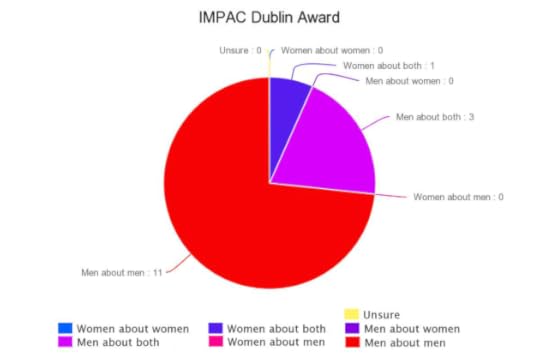
 As you can see, the IMPAC, one of the richest book prizes in the world, given for “excellence in world literature,” gives zero out of the last 15 prizes to stories by women about women—but 11 to stories by men about men. Compare this to the more populist Costas, which cheerfully declare they are for “well-written, enjoyable” books: 3 go to women writing about women. In other words, no surprises: the more consciously prestigious the award, the less likely the prize is to go a woman writing about women.
As you can see, the IMPAC, one of the richest book prizes in the world, given for “excellence in world literature,” gives zero out of the last 15 prizes to stories by women about women—but 11 to stories by men about men. Compare this to the more populist Costas, which cheerfully declare they are for “well-written, enjoyable” books: 3 go to women writing about women. In other words, no surprises: the more consciously prestigious the award, the less likely the prize is to go a woman writing about women.
More data to follow. Hopefully a lot of data.








July 27, 2015
New interview in the Seattle Review of Books
The Seattle Review of Books, founded by Martin McClellan and Paul Constant, launches today.
Seattle is the greatest book city in the United StatesWe have marvelous bookstores, excellent libraries, a vibrant community of writers, the most eager readers, world-famous institutions devoted to the art and craft of writing and reading, and a tremendous readings scene that hosts thousands of literary events a year. But for a multitude of reasons, Seattle’s media barely bothers to cover books at all.
We felt it was time for a publishing venture that intends to reflect, record, and celebrate our underserved literary community. From writers to readers, from booksellers to librarians, from new releases to antiquarian discoveries, we want to examine exactly what it means to love books and writing in Seattle in the 21st century. We believe the book review is an underrated art form, and we want to publish as much beautiful writing about books as humanly possible.
Paul interviewed me for the launch:
(Nicola Griffith, best-known as the local author of Hild, published an astonishing blog post in late May of this year. Titled “Books about women don’t win big awards: some data,” Griffith presented a number of striking charts demonstrating the gender split between winners of awards like the Pulitzer Prize, the Man Booker, the National Book Award, and the Newbery Medal over the last 15 years. Unsurprisingly, more men than women have won almost all of those awards. But then Griffith noted an especially interesting statistic: the women who do win awards tend to win for books about male main characters. The post went viral. One week later, Griffith asked other people to take up her charge, to help count women’s voices in literature:
So, we need data. This is where you come in. We need many people counting many things. The more who count, the less each of us has to do.
Last week, Griffith spoke with the Seattle Review of Books about her findings, the status of the project, and what all this damning data means for the state of the publishing industry.)
Thanks so much for making the time for us. First, I wanted to talk about how you came to decide to quantify this gender divide in a way that, to my knowledge, had never been done before.
It’s a whole bunch of coming-together of circumstances. It’s something I’ve been thinking about for years — I definitely was talking about it in the early 2000s. I remember doing a blog post called “Girl Cooties,”which was basically about this issue. I’d done a rough [gender] count, but I hadn’t done the graphs. People listened, but it didn’t really go anywhere; everybody kind of knows it’s true, but they don’t want to see it.
My book Hild was out here in paperback and it came out in the UK in hardcover, so I had to do publicity — write “five-best” lists and, you know, that kind of thing. So I was thinking about my five favorite historical novels and I wrote them down and I was pleased because at least three of them, or actually four of them, were by women. I thought, “yay women!” And then I realized that those books by women were all about men. And then I thought, “goddamn.” These were my influences.
And at that point, my wife was working — still is working — downtown at an SEO-based tech company. She was having to rejigger how she presented her material to them, and so she started doing a lot of charts. And so I looked at the charts one day, and I thought to myself, “you know what? I could do this in charts.”
If you read the rest (it’s a bit under 3000 words) you’ll see it’s conversational, and quite unlike my written style. This is because the interview is a verbatim transcript of a phone conversation (no editing, at least not by me). I’d love to know what you think.








July 24, 2015
Cory Doctorow in conversation with Frank Catalano, Seattle, July 28th, 7 pm
Seattle! Want to see Cory Doctorow talk about his fab books Little Brother, Homeland, Pirate Cinema? Or about privacy, cryptography, social activism, and what it means to live in a world where surveillance is becoming ever-present? Publishing? Freedom of information? He’ll be in conversation with Geekwire columnist Frank Catalano on Tuesday, July 28 at 7:00 pm at University Temple United Methodist Church, 1415 Northeast 43rd Street (across the street from the University Book Store).
Tickets are $10 from Brown Paper Tickets.
Proceeds from the event support the ongoing operations of Clarion West, which has for more than 30 years helped emerging writers level up and kickstart their careers. When you spend this fascinating evening listening to Doctorow read, talk, and answer questions, you’re also supporting one of the best writing workshops on the planet.
Go buy a ticket and have a blast!








July 22, 2015
The Mother in speculative fiction
The Shirley Jackson Awards are presented at Readercon every year. I found out just a week or so before travelling that it’s traditional for the Guests of Honour to make a short speech there. Here’s what I came up with. (I didn’t actually deliver the two paragraphs between the asterisks due to time constraints. Also, frankly, because of empathy for the nominees: it’s hard to wait to find out whether you’ve won or lost and I didn’t want to contribute to anyone’s stress!)
The Shirley Jackson Awards, 7/12/15
On June 26th 1948, 67 years ago, the New Yorker published Shirley Jackson’s most famous short story, “The Lottery.”
—Actually, June 26th is turning into a big day in our household. It’s the anniversary of day I met Kelley at Clarion in 1988, the day SCOTUS struck down DOMA in 2013, and of course its decision this year on marriage equality.
Anyway, 67 yrs ago, right around now, that is, a couple of weeks after publication of “The Lottery,” I’m guessing Shirley Jackson already had the bulk of the hundreds of indignant letters about the story that were sent to her via the New Yorker—so many letters that according to the Writers’ Almanac her mail carrier stopped speaking to her. Even her mother complained: “Dad and I did not care at all for your story in The New Yorker … [I]t does seem, dear, that this gloomy kind of story is what all you young people think about these days. Why don’t you write something to cheer people up?”
It’s something my own mother might have said. I remember her saying about one of my novels—Stay, probably—”Nicola, don’t you think there’s too much description?” Well, no, Mum, I said. Otherwise I would have taken it out. (Having said that, my father’s only comment about my work—after he read a draft of an early story—was, “There’s no e in lightning.”) I do wish Mum could have read Hild; I think she would have liked it—though no doubt she would have thought there was too much description.
Jackson’s relationship with her mother was not perfect. Apparently she wasn’t conventional enough for her mother’s taste. I’m guessing this was true until the day Shirley died of a heart attack, aged 48.
I think most of us struggle with our mothers at some point on the way to becoming ourselves.
Adrienne Rich said that cathexis about the mother-daughter relationship is “the great unwritten story” in US and UK fiction. By this she didn’t mean women don’t write about it, but that critics don’t.
This is particularly true in terms of our genre. For example, there’s no entry under MOTHERS in the Encyclopedia of Science Fiction. No one seems to discuss the fictional treatment of the mother-daugher relationship in speculative fiction. Except, of course, when the fiction is by men. (Lots of ink spilled over Stephen King’s Carrie…) Mother-son and father-daughter relationships get a lot of attention, too—just sticking to classics, Oediupus and Hamlet and Lear are obvious examples—while father-son issues are absurdly over-represented, especially in Hollywood.
Writers can’t always be trusted to declare our own influences, which is why it would be great to see input on this from those of you who are critics. Jackson, for instance, claims “The Lottery” was her response to WWII and her subsequent understanding—in light of the German concentration camps, certainly, and probably of internment camps for Japanese-Americans—of how awful ordinary people could be.
***
There’s a big SFE entry for WAR. I bet many of us could come up with a list of important writers without blinking: Ambrose Bierce, J.R.R. Tolkien, Joe Haldeman… The list of men is almost endless.
But I’d love to see full and proper treatment of British women of the first half of the 20th C whose f/sf/h was shaped by WWI—Cicely Hamilton, Storm Jameson (and, to a lesser extent, Virginia Woolf and Vita Sackville-West). And of North American women whose work was shaped by later conflict and the threat of same (particularly nuclear war)—Leigh Brackett, Vonda McIntyre, Katherine Burdekin, Tiptree, CL Moore…
***
Shirley Jackson’s most famous short fiction may have been shaped by war but in her most famous novel, The Haunting of Hill House, it’s the relationship between Eleanor and her mother that’s pivotal.
For most writers, our relationship with our mother is the bedrock of early existence. It has a profound influence on who we are, how we think, and what we write. It’s time for a study of that relationship in our fiction, especially in work by and about women. The mother-daughter relationship is a rich seam, just waiting to be explored—and the people in this room are the ones to do it.








July 20, 2015
Readercon report
Readercon 26 was a wonder and a delight. I recommend it highly. There was only one thing about the trip I didn’t like: I bricked my phone. But, hey, I finally had a reason to upgrade, so even the worst part of the trip had a silver lining…
There were many lovely moments at the convention. Here are my favourite bits:
The people
Smart, generous, interesting, slightly geeky. In other words, my people. Some of whom were good friends—long-time friends and more recent—and some who will become friends. There is nothing better than to feel at home among several hundred people from a multitude of places (metaphorically and literally).
The programming
Smart, generous, interesting, slightly geeky. Sometimes moving. Often funny. Always well-run. The best bits for me were:
Outer Alliance group reading: The room was packed, standing-room only. It wasn’t a big room—so five dozen people, max—but this was 7 pm on a Saturday evening so I was delighted. The reading itself went like a creamy clockwork dance. I think there were 8 readers, yet we came in under the wire because everyone played nicely—and it was run, by Julia Rios, with an iron fist in a velvet glove. The readings themselves were beautiful. The feeling in the room was truly moving. Seriously so at a couple of points: Kelley’s reading made me weep and I don’t think I was the only one.
Staged interview with Kelley: again, a packed room, but this time the room was big. I don’t know what the capacity was (300?) but it was full. And the audience seemed to like what they heard. Kelley did not share the questions with me beforehand so they were as surprising to me as to the audience. It worked well, I think. I ended up comfortable and candid. People laughed; I think one or two cried. And, hey, there was wine! With any luck there’ll be audio and/or video at some point. When that happens I’ll link.1
I was counter-programmed during a couple of events I would like to have attended, and wiped out and in need of a break for a couple of others. But I went to/participated in about 20 things, and they were all worthwhile.
The systems
Hard to differentiate these from the people, really, because they were designed and run by people, volunteers all. They did a fabulous job. I was impressed by the organisation and the thoughtfulness, especially regarding physical access.
Here’s what every convention should mirror: ramp to the stage, taped off places for wheelchairs/scooters in every room, and a public and clearly-stated policy regarding behaviour around those who have mobility challenges. In a perfect world the bathrooms would have had automatic buttons for those in chairs but this is very, very rare and (I’m guessing) almost impossible to ensure for a convention, so it remains a hope for the future and not a complaint. I can’t speak to other disability issues but the concom did a good job with mobility.
Similarly, the concom handled safety very well. The code of conduct, specifically harassment policy, was excellent. More importantly, it was prominent: displayed on a huge board on the main thoroughfare, with security phone numbers printed on membership badges.
As guests, Kelley and I were very, very well taken care of. If anyone reading this is ever invited as Guest of Honour, you really should say yes! Thank you to the Readercon community for an amazing experience.
1 I’ll link to other stuff as I get it. Up in the next day or two here: the text of my speech at the Shirley Jackson Awards.








July 9, 2015
New essay: The Women You Didn’t See
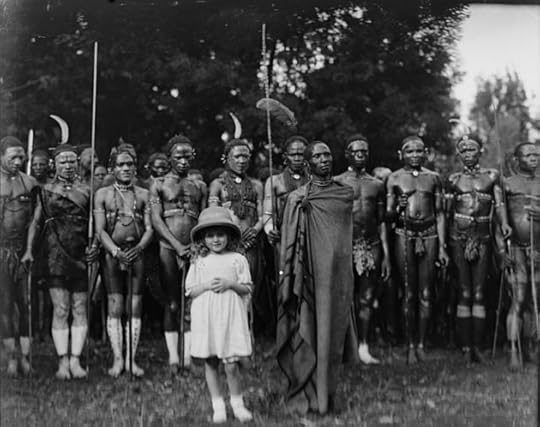
Alice Sheldon among the Kikuyu people (public domain)
Up at the Los Angeles Review of Books my essay, “The Women You Didn’t See.”
You were brilliant, I think, but consumed by the inevitability of the abattoir. In your fiction, all the gates are closed; characters are funneled down a chute to flashing knives. In your best fiction, the characters know what is happening, but the knowledge makes no difference; there’s no way out.
The editor at LARB, Tom Lutz, calls it epistolatory criticism, and it is–to a degree. It’s also a meditation on gender and its discontents: was Sheldon trans, genderqueer, or a woman who loved women? We’ll never know for sure, but I have my theories. I’m aware I could very well have got a lot wrong on this subject. I’d love to hear what others think and am more than happy to talk about it. The only rules? Assume good intent and play nicely.
If you like the essay, you might want to buy Letters to Tiptree, an anthology edited by Alisa Krasnostein and Alexandra Pierce (Twelfth Planet) to celebrate the 100th anniversary of Alice Sheldon’s birth next month. It has a stellar list of contributors. If Tiptree/Sheldon interests you at all, it will be a must-read. So pre-order now.
I’ll be reading the essay tomorrow at Readercon.









